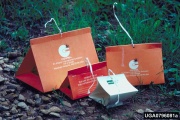Difference between revisions of "Pheromone lures"
Jump to navigation
Jump to search
| Line 11: | Line 11: | ||
° M. Gilberg, "Monitoring ''Anghrenus verbasci'' in museum collections using a sex pheromone lure", WAAC 71(2) 1995. [http://palimpsest.standford.edu/waac/wn/wn17/wn17-2/wn17-207.html Link] | ° M. Gilberg, "Monitoring ''Anghrenus verbasci'' in museum collections using a sex pheromone lure", WAAC 71(2) 1995. [http://palimpsest.standford.edu/waac/wn/wn17/wn17-2/wn17-207.html Link] | ||
| + | |||
° ISCA Tech: [http://www.iscatech.com/en/info/lure_tips.html Lure tips] | ° ISCA Tech: [http://www.iscatech.com/en/info/lure_tips.html Lure tips] | ||
| + | |||
° Cooper Mill: [http://www.copermill.com/stored/htm Pheromone Lures] | ° Cooper Mill: [http://www.copermill.com/stored/htm Pheromone Lures] | ||
Revision as of 11:45, 30 May 2020
Description
An insect trap that uses a synthetic pheromone as a bait. Pheromones are endogenous chemicals secreted in tiny amounts by some animals and insects to communicate with other members of its species. Each type of pheromone is specific to a given species. Pheromone traps may be used in conjunction with a pesticide to kill the insects or they may be used to monitor an area for the presence of insects.
Synonyms and Related Terms
pheromone traps; phermone (sp); Lasio Lure (pheromone for cigarette beetle)
Additional Information
° M. Gilberg, "Monitoring Anghrenus verbasci in museum collections using a sex pheromone lure", WAAC 71(2) 1995. Link
° ISCA Tech: Lure tips
° Cooper Mill: Pheromone Lures
Sources Checked for Data in Record
- External source or communication Comment: M. Gilberg, Monitoring Ahtrenus verbasci in museum collections using a sex pheromone lure WAAC 71(2) 1995
